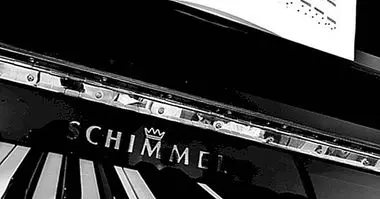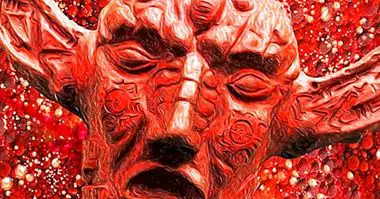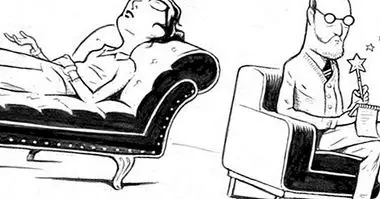Eros: what is the life drive according to Sigmund Freud and psychoanalysis
Although the concept of eroticism is generally related to sex, the truth is that it is not limited to it: eroticism also includes a part of sensuality, falling in love, bonding, play and vitality. And in fact, it is something that does not even have to refer to a human being: a theme, idea or even landscape may seem erotic in a certain sense. Eroticism is a very worked aspect by numerous authors, being probably one of the most known Sigmund Freud, which identified Eros and sexual energy or libido as the fundamental parts of psychic life . And it is about this author's vision of the concept that we are going to talk about throughout this article.
- Related article: "Sigmund Freud: life and work of the famous psychoanalyst"
The drives as a fundamental element of psychic life
To understand the concept of Eros from the psychoanalytic perspective, it is first necessary to know the concept of drive and its importance in the human psyche.
It receives the name of drive all that impulse or force that leads the subject to carry out some type of action, generally in order to satisfy some type of need. These are powerful forces that arise before a state of bodily tension, which seeks to be resolved.
The drive is ultimately the origin of all mental activity , being psychic representative of somatic stimuli of the body, and consists of source (organ from which the drive is born), force (degree of thrust to action), goal (satisfaction of excitation) and object (what satisfies it).
It is therefore one of the fundamental concepts of psychoanalysis, along with the unconscious, when it comes to explaining psychic life. Specifically, it is part of the so-called economic personality model Freud, which attempts to explain human performance as a product of the attempt to resolve states of bodily tension.
The author considered that the psychic energy that governs our behavior was based on sexual impulses , integrating these in the concept of libido (which would not only include sex but if considered as the main force) and linked to the search for satisfaction and pleasure. From this idea, which would later include not only sexual energy but also that dedicated to self-preservation, the notion of the life drive, also known as Eros, emerges.
- Perhaps you are interested: "The 9 types of Psychoanalysis (theories and main authors)"
Eros: life drive
It receives the name of Eros or pulsión of life the impulse generator of activation and excitation at organic level that appears with the main objective of guarantee survival and keep living matter together and integrated , looking generally to generate increasingly complex unions and the satisfaction of needs, especially sexual ones.
This type of drive integrates two concepts that Freud initially considered separated: the sexual drive and the self-construction drive. It is a force that generates dynamism and activity, leading to behavior and the search for satisfaction
This principle is based on the pleasure principle, according to which the psyche's main function is that of look for pleasure and avoid displeasure . This is achieved from the search for the reduction of tension. It is also influenced and mediated by the reality principle: depending on the consideration that the drive may be inadequate or unrealizable (something that is linked to the self and the superego), we can sublimate it and reach a partial gratification through a rodeo .
Eros also leads us to maintain relationships both with ourselves and with others, allowing the appearance of the approach and identification with others.
There are multiple acts in which Eros expresses itself , resulting in the easily visible life drive: besides sex, feeding, defecation, kissing and caressing or dreams are examples of this. It requires an object to which to go and from which to obtain gratification.
A fundamental concept in psychoanalysis
The concept of life drive and Eros is one of the core elements of Freud's theory, together with the ideas of the unconscious and the intrapsychic conflicts .
One of the elements that influences to a large extent is the Freudian vision of psychosexual development, in which the focus of sexual gratification is changing throughout development (going through the mouth, anus, phallus and genitals) and can there are bindings that produce pathological difficulties.It is also basic in the generation of conflicts between the id (desires and unconscious impulses) and the ego, making the latter apply the reality principle and occur a balance between censorship and satisfaction of impulses .
- Related article: "The id, the self and the superego, according to Sigmund Freud"
Your relationship with the Thanatos
Although the idea of the libido and the sexual drive already existed much earlier in the thought of Freud, the concept of Eros was born at the same time as that of a type of drive opposed to this: the death drive or Thanatos.
Both concepts are completely opposite: Eros is life and vitality, dynamism, sexuality and pursuit of pleasure and survival while Thanatos represents the unconscious desire for death, back to the inorganic , of regression, rest and dissolution. Eros is union and Thanatos disintegration.
However, to interdependent drives that appear together and even merge in part, leading to different types of behavior. In fact, there is no human action in which both components do not exist. In conclusion: there is no death without life or life without death.
Bibliographic references:
- Freud, S. (1976). Beyond the pleasure principle OC XVIII 1920; 1-62.



















